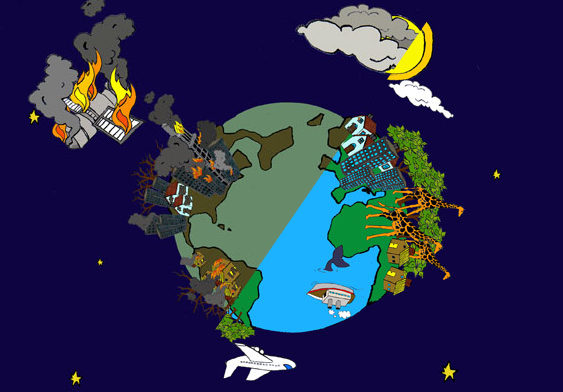Topsight: February 4, 2009

• The Year Ahead, Sterling-style: Bruce Sterling and his European alternate identity Bruno Argento both present visions of what 2009 will hold in the latest edition of Seed magazine.
Bruce's is the pessimistic view -- 2009 Will Be a Year of Panic:
2009 will be a squalid year, a planetary hostage situation surpassing any mere financial crisis, where the invisible hand of the market, a good servant turned a homicidal master, periodically wanders through a miserable set of hand-tied, blindfolded, feebly struggling institutions, corporations, bureaucracies, professions, and academies, and briskly blows one's brains out for no sane reason.
Bruno takes a more optimistic perspective -- The True 21st Century Begins:
The year to come is best approached as a learning opportunity. It offers a golden chance to bury our dead prejudices and learn how to properly feed the living. Once we stop shaking all over and scolding Americans, we will recognize the tremendous potential this new century offers the people of the world. The sun still shines, the grass still grows, we are still human. If we stopped pretending to be puppets of an invisible hand, we would not fret over the loss of the 20th century's strings. We might see that life is sweet.
The year ahead is not already set in stone. There are divergent forces at work, and we still have a role in shaping what kind of outcomes we see.
• Press the Reset: Wired reports that NATO is looking for a simulation system able to model the "Political, Military, Economic, Social, Infrastructure and Information (PMESII) domains" in Afghanistan -- essentially, a SimAfghanistan.
The Wired report has the usual assortment of skeptical and incredulous replies, with nobody really making the point that the goal of a sim like this shouldn't be to create a mirror Afghanistan, but to have a tool to uncover hidden interactions and unanticipated consequences of strategies. In short, a sim like this won't tell you what will happen, but could be useful for showing what might happen that you didn't expect to see.
• The (News)Paperless Society: I had a chance to sit down with some independent press folks the other night to talk about the future of media, and their conclusions were grim. In this case, I'm something of a catastrophic optimist: I think that the global media, American in particular, will crater and come close to death, but that something wonderful will emerge from that crisis.
One interesting data point along the way, indicative of both the fall and (potential) rise: tech economy insiders, looking at the numbers, now claim that for less than the New York Times pays in a year for print and distribution of its papers, it could give a Kindle electronic book reader to every one of its subscribers and quite a few of its newsstand readers.
That's indicative of more how insane the costs are for print than how cheap e-book readers are; as Ars Technica's John Siracusa writes, we still haven't seen the e-book revolution, and are nowhere near seeing the technology's true impact and importance.
• Mother Should I Build the Wall? The Gaia hypothesis argues that the Earth's systems are generally homeostatic, driving towards balance and avoidance of disruption. From that perspective, we're better off trying to minimize our footprints as much as possible, so as to allow natural processes to work as they should. As a model for behavior, it's lovely, inspiring, and quite possibly completely wrong.
Paleontologist Peter Ward, who specializes in the study of mass extinction events, argues that the Earth's systems tend instead to drive towards catastrophe, with runaway processes repeatedly bringing the planet to the brink of total extinction. And here's the twist: life itself is one of the major drivers of planetary catastrophism. Not just humans, but all life, especially microbial life which has, over the past 4 billion years or so, repeatedly covered the planet with poisonous gases and altered the climate enough to cover the planet with ice. Ward calls his alternative model the "Medea hypothesis," after the character in the play by Euripedes who kills her own children as vengeance against their father.
Rather than homeostasis, Ward argues that the Earth goes through boom-bust cycles, and that environmental feedbacks tend to make disruptions worse rather than bringing them back into balance. Although Ward admits that the full-blown Medea hypothesis is as exaggerated as the Gaia hypothesis -- and that Earth's history has both homeostatic and heterostatic processes -- he believes that the Medea perspective is an important, and under-represented, point of view.
Ward is right to say that most environmental arguments are based on the belief that "leave nature alone and we'll be okay." But what if we're wrong? Geological history is filled with mass extinction events. Humans are causing a few of their own -- but we may be the first species in this planet's history able to prevent them, too.





